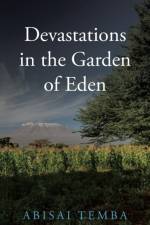av Abisai Temba
335
Devastation in the Garden of Eden is a book in which the author aims to paint a picture of what actually has been happening on Kilimanjaro Mountain area. He almost emotionally endeavors to enlighten mankind and especially people who know Mount Kilimanjaro and the area around it about how attractive the mountain and the area around has been since the time immemorial. It was such a masterpiece of God, giving the example of the Biblical Garden of Eden in which God put the first man and woman, but in spite of the perfection, beauty, and bounty of resources that were put in that garden, still mankind decided to trespass. They decided to disobey God's rules, and in the end, they got banished from the garden. The author has deliberately made this comparison with the Garden of Eden for the similarities are so closely related. In reality, that is exactly what the mountain area was like. Many people from different parts of the world have stood up and bear witness that Kilimanjaro Mountain is not only a geographical place somewhere in the continent of Africa but is a unique place and serves as a magnet to attract the humankind from various parts of the world and of various walks of life to it. Unfortunately, we will soon or later see mankind getting banished from Kilimanjaro and the area around it. Like what happened in the Garden of Eden, Kilimanjaro has faced a lot of mismanagement, and that has been in spite of the laws, regulations, and rules that, at one historical time or the other, have been put in place. Natural resources have disappeared in various ways and forms. People, ecology, and the overall ecosystem are being put to great danger. The author shows concern and calls upon the local as well as international community to come forth to address the situation. He does not attempt to point an accusing figure to any specific person or community, as almost all of us have been involved in one form or the other. He thus concludes that this should not be a war for one person, one community, or one nation, but the whole global community should join hands to reverse the ongoing situation. He ends with a remark "We must hang together, or we will all perish."



